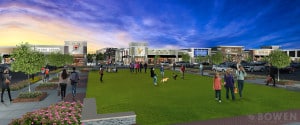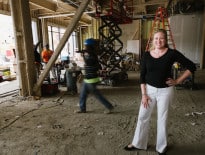Are we entering phase two of the live-work-play phenomenon sweeping the development industry in Eastern Massachusetts?
From the transformation of Burlington’s Northwest Park with its 3rd Ave. outdoor shopping center to the ground-up construction of Somerville’s Assembly Square, the region has seen multiple arrivals of mixed-use developments including retail and housing in close proximity.
The phenomenon has mostly been focused inside Route 128.
Now the owners of the Hanover Mall on the South Shore are moving ahead with a plan to reinvent the 1970s-era property. It could be a harbinger of more redevelopments stretching toward the outer suburbs, prompted by the online shopping revolution that’s caused older shopping malls and big-box stores to struggle.
“There’s been an overall mind shift on how to live and how to shop,” says Lloyd Sova, vice president of PECO Real Estate Properties (PREP), which purchased the 47-year-old Hanover Mall two years ago for $40 million. “We’re responding to that shift.”
In the case of the Hanover Mall, it’s a more radical shift than other recent mixed-use redevelopment projects: At a cost of $225 million, PREP plans to demolish most of the 750,000-square-foot enclosed mall, keeping only a portion that now holds a Macy’s store. A 620,000-square-foot open-air shopping center would be built on the site, similar to the replacement of the enclosed Shoppers World in Framingham with an outdoor shopping center in the 1990s.
Shoppertainment Comes to Hanover
Reflecting the latest thinking in retail development, PREP plans to add a significant dose of restaurants and entertainment facilities (including a rebuilt 1,000-seat movie theater) – and 300 “high-end luxury” apartments, mostly one- and two-bedroom units, with 10 percent of the dwellings designated as affordable. The Hanover Co., located in Houston, Texas, is leading the residential component of the Hanover Mall redevelopment. The mall is being rebranded as “Hanover Crossing.”
The project is still going through the town approval and a public hearing process. Sova said there’s “not a whole lot of opposition,” although a planning board member had expressed concerns about potential drains on town services.
Whether the current proposal moves forward, Sova said a makeover is needed because of market forces that are changing the nature of shopping.
“It’s something that’s very desirable today,” he said of transforming shopping malls into mix-used developments. “It’s a big change from the past.”
Mark T. Vaughan, a commercial real estate attorney at Riemer & Braunstein, agrees changes are in store for most brick-and-mortar shopping meccas.
“The retail landscape has certainly become more challenging,” said Vaughan. “Shopping malls are trying to be more creative and innovative, more of a social-gathering place.”
Vaughan’s firm represents several major retail landlords in the region, including Simon Property Group, owner of the Burlington Mall, and Eden LLC, owner of the Woburn Mall. Both malls are planning major makeovers.
Restaurants Replace Sears Auto In Burlington
The Burlington Mall’s plans are not as radical as what’s planned at Hanover Mall – but they still represent big changes. The first floor of the former Sears building is being re-configured into a more outward-facing facility, complete with an “outdoor pocket park” and patio for programming and cafes, as part of an attempt to make it more attractive and accessible.
The former Sears Auto Center, a separate 45,000-square-foot facility outbuilding, is also being re-purposed, Vaughan said.
Plans submitted to the Burlington planning board call for its replacement with a 35,000-square-foot building with nine stores and five restaurants with seating capacity for 316 patrons, in addition to 157 patio seats. The former Sears store will be repositioned with 124,299 square feet of retail space and 39,011 square feet reserved for restaurants, along with 335 outdoor patio seats.
And Woburn Mall owner Edens, a South Carolina-based retail developer, is seeking to build several hundred multifamily units in the rear parking lot while partially redeveloping the mall interior.
Rob Robledo, a senior vice president and partner who heads the suburban retail group at CBRE in Boston, sees more changes in the works for the region’s shopping malls.
In particular, he sees more re-development of struggling malls outside of 128 and even 495, specifically what he calls “C and D class” malls in less populated towns.
“They have to make them more viable,” he said. “They need to re-invent themselves. It’s definitely a trend. They need to change.”







